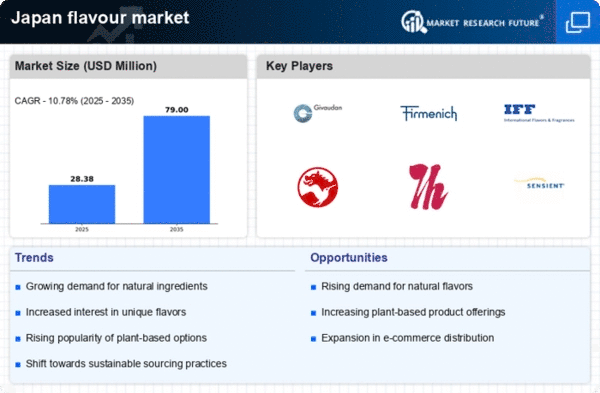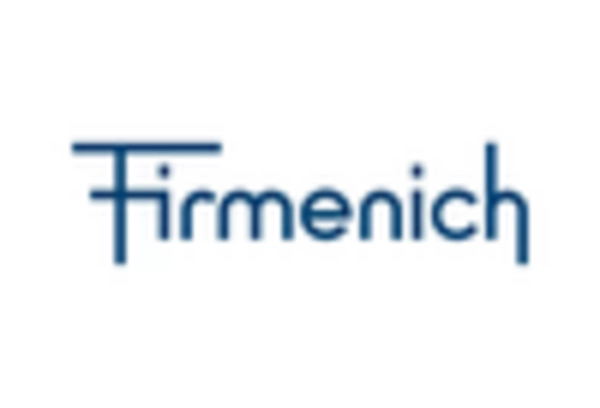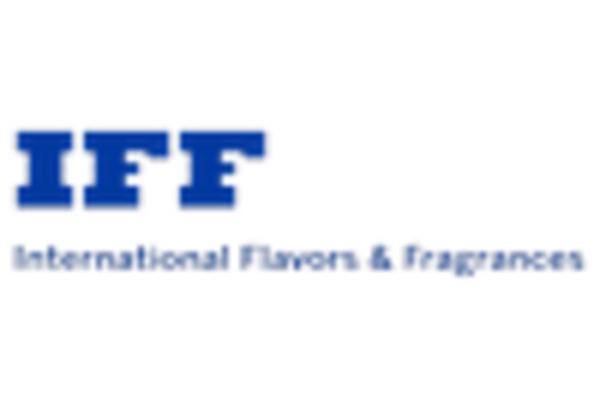Growing Demand for Unique Flavours
The flavour market in Japan is experiencing a notable shift towards unique and exotic flavours. Consumers are increasingly seeking out products that offer distinctive taste experiences, which has led to a rise in the introduction of innovative flavour profiles. This trend is particularly evident in the beverage sector, where sales of specialty drinks featuring unconventional flavours have surged by approximately 15% in the past year. The flavour market is adapting to this demand by investing in research and development to create new and exciting flavour combinations that appeal to adventurous consumers. As a result, companies are likely to focus on enhancing their product offerings to capture this growing segment of the market.
Health-Conscious Consumer Preferences
In Japan, there is a marked increase in health-conscious consumer preferences that significantly impacts the flavour market. As consumers become more aware of the health implications of their food choices, there is a growing demand for flavours that are perceived as healthier or more natural. This shift has led to a 20% increase in the sales of products featuring natural flavours over the past year. The flavour market is responding by reformulating existing products to reduce artificial additives and enhance the use of natural ingredients. This trend not only aligns with consumer preferences but also positions companies to meet regulatory standards that increasingly favour transparency and healthfulness in food products.
Cultural Influence on Flavour Preferences
Cultural influences play a pivotal role in shaping flavour preferences within the flavour market in Japan. Traditional Japanese flavours, such as matcha and yuzu, continue to hold significant appeal among consumers, driving demand for products that incorporate these elements. The flavour market is capitalizing on this trend by integrating traditional flavours into modern products, thereby bridging the gap between heritage and contemporary tastes. This approach has resulted in a 10% increase in the market share of products featuring traditional flavours, indicating a strong consumer affinity for familiar tastes. Companies are likely to continue exploring ways to innovate while respecting cultural heritage, ensuring that they remain relevant in a competitive landscape.
Sustainability Trends in Flavour Sourcing
Sustainability is becoming a critical consideration in the flavour market in Japan, as consumers express a growing preference for ethically sourced ingredients. This trend is prompting companies to adopt sustainable practices in their flavour sourcing strategies. The flavour market is witnessing a shift towards sourcing ingredients from sustainable farms and suppliers, which not only meets consumer demand but also aligns with global sustainability goals. Recent surveys indicate that approximately 30% of consumers are willing to pay a premium for products that feature sustainably sourced flavours. This shift is likely to encourage companies to enhance their sustainability initiatives, thereby fostering a more responsible and environmentally friendly flavour market.
Technological Advancements in Flavour Development
Technological advancements are transforming the flavour market in Japan, enabling companies to develop more complex and appealing flavours. Innovations in extraction and synthesis techniques allow for the creation of flavours that were previously unattainable. This has led to a surge in the introduction of new products that feature enhanced flavour profiles, appealing to a broader audience. The flavour market is increasingly investing in technology to streamline production processes and improve flavour consistency. As a result, companies are likely to see a reduction in production costs while simultaneously enhancing product quality, which could lead to increased market competitiveness and consumer satisfaction.

















